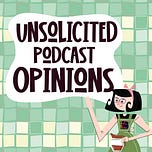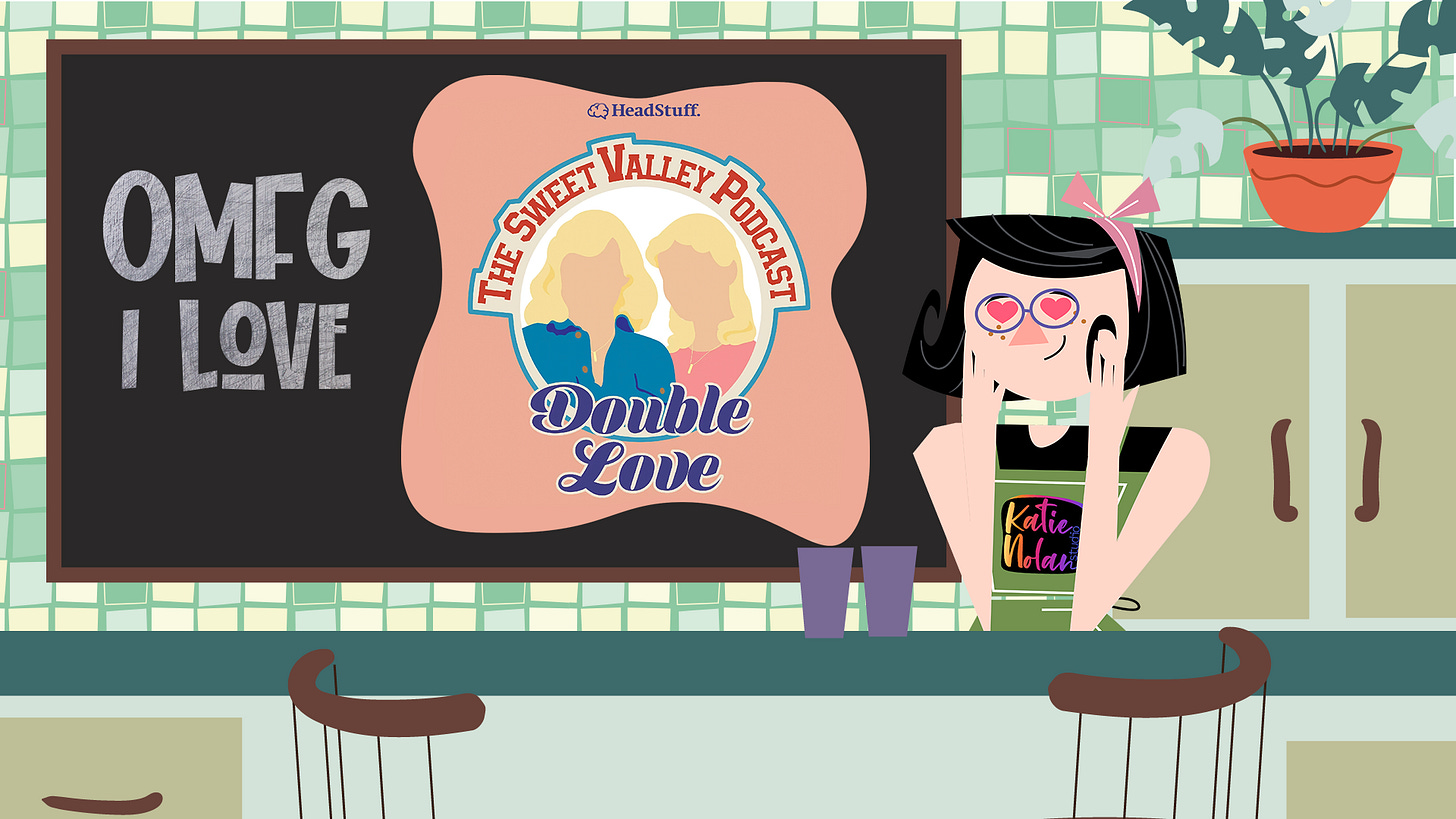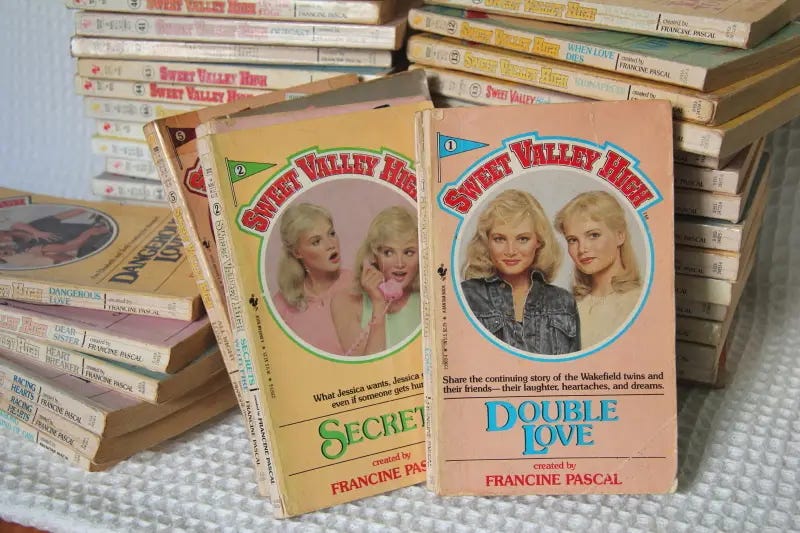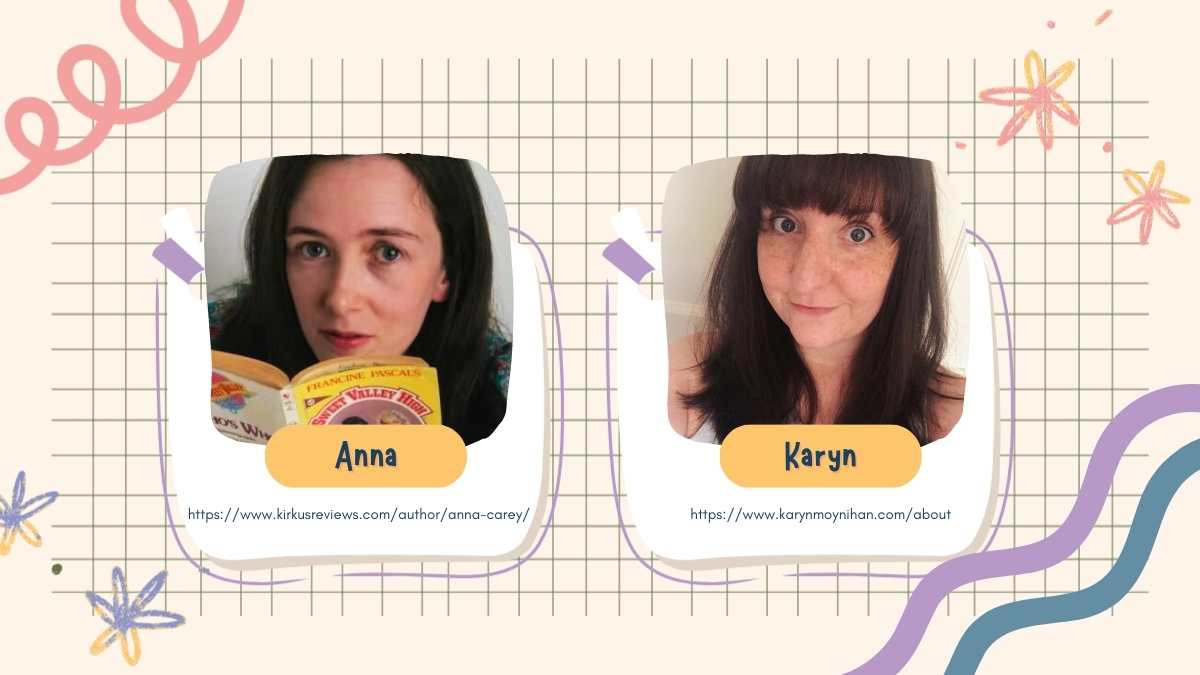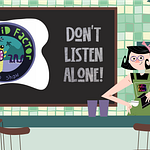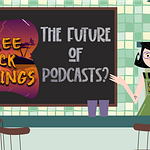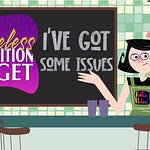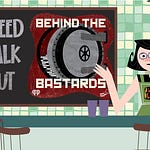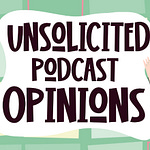We’re here! We’re queer! We’re more opinionated than ever!
But seriously, I am so excited to be (finally!) sharing this project with you. I love media criticism, and I’ve gotten so much joy from the work of critics like Dan Olson and Sarah Z — even when I’m not familiar with the work they’re critiquing.
So I hope you’ll enjoy this podcast, regardless of your familiarity with the shows I cover.
Now, let’s get going!
Putting all my cards on the table: I’m a queer, disabled creator, and a recovering theater kid. I need attention (and income) to survive. Please consider supporting my work with a free or paid subscription. (Seriously. Either option helps!)
Annotated Transcript
Dia dhuit, my friends!
I’m Katie Nolan, and this is Unsolicited Podcast Opinions, the show where you get more than my two cents: you get the whole damn dollar.
I like podcasts. I like talking about podcasts. I like deconstructing podcasts in such granular detail that my housemates duct tape my mouth shut. Of course, you would never do that to me, dear listener (because you can’t).
So in this series, I’m sharing it all: the opinions nobody asked for; the tangents nobody could have anticipated; and fully annotated episode transcripts, with footnotes & everything. Because I’m a nerd with an anxiety disorder; I cite my sources.
Today I want to talk about Double Love, which describes itself as:
Anna: the podcast that explores the strange and terrifying world of Sweet Valley High, book by book.
I fucking love this show.
Seriously. I’ve probably listened to it all the way through three or four times, and some favorite episodes even more than that. I mean, I designed my entire Animal Crossing island around it. (Dream address in the show notes, for anyone who still plays.1) During the worst parts of the pandemic, Double Love became my happy place.
The hosts keep me company; they make me laugh; but what I really love is that they make me think. I mean, they don’t force me to—no one can force you to think—but I’ve been chewing on this show since May 2021, and I’m still finding new concepts to explore and ideas to consider.
Now, if you didn’t consume YA literature in the eighties and nineties, you may be wondering:
What on earth is Sweet Valley High?
Sweet Valley High is an entire universe of novels by Francine Pascal, which was first published in 1983. It follows identical twins Elizabeth and Jessica Wakefield and their absurdly dramatic lives, filled with multiple kidnappings, drug overdose deaths, serial killers, two murdered boyfriends…
And we’re expected to believe this is the perfect, idyllic American town and that these girls live charmed lives.
The credited author, Francine Pascal, started her writing career on The Young Marrieds2, a soap opera that ran on ABC from 1964 through 1966.3
In 1977, at the age of thirty-nine, she published her first young adult novel, Hanging Out With Cici. It was popular enough to get two sequels and adapted into the afterschool special My Mother was Never a Kid in 1981.4
Riding high on that success, Pascal began pitching a soap opera about highschoolers, but TV networks weren’t biting. Evidently, “They said it was too girly,”5 which… fuck that.
So instead, she took that nugget of an idea and transformed it into her next book series: Sweet Valley High.
Now, you may have noticed I called her the “credited author” earlier, and that’s because she didn’t actually write any of the books. She developed the character bibles and the basic story beats for each novel, and then she handed that off to a team of ghost writers who are collectively known as “Kate William.”
Now, why you needed a nom de plume for the ghost writers when everything was already published under Francine’s name, I don’t know. It may have been part of a larger trend in the eighties and nineties where certain forms of entertainment were considered low-brow and thus were treated like products instead of art. This is a thing that was particularly prevalent in the video games industry,6 but I haven’t been able to find any explanations specific to novels.
Sweet Valley High was wildly successful. It wasn’t just a book series: it was an entire franchise. It is, like, the Sweet Valley High Cinematic Universe. It has seven spin-off book series and two standalone sequels, making a grand total of 527 books, assuming I did my math right.7
According to a CNN article8, as of 2011 the books had been translated into twenty-five different languages and sold 150 million copies worldwide.
And it wasn’t just books. It got four puzzles, a board game, and it was adapted into a syndicated TV series that ran for eighty-eight episodes.
It was huge. Hell, it still is. As recently as 2021, the CW has talked about rebooting the TV series9, and the Sweet Valley Twins graphic novel series launched in November 2022.
So of course there are podcasts about it.
Seven that I’ve found at time of recording, but Double Love is both the longest-running and one of the few still active.
It’s hosted by Anna Carey, a journalist and young adult author, and Karyn Moynihan, a freelance graphic designer.
In a special Q&A episode for their four-year anniversary, Anna explains that she got the idea for the series while listening to another recap podcast.
Anna: They were recapping one of the Sweet Valley books and it was sort of not linear enough? Like I was thinking, Jesus, I have read that book. A very long time ago. And I would be a bit confused. Because, see—they were being funny, but it was… they weren’t sort of telling the story, so I think if you didn’t know it, it would be slightly confusing.10
She wanted to do a Sweet Valley recap podcast in the style of the late, lamented website Television Without Pity, which was originally known as Dawson’s Wrap.11 You can think of it like Cliff’s Notes for TV shows, but longer and with a lot of snarky commentary.
As for Karyn, she was already writing a Sweet Valley recap blog, which made her an obvious choice for co-host. The two say they were “friendly acquaintances” when they started the podcast in 2017 – Ireland is a small country and both being Irish bloggers, you couldn’t help but know each other – but you wouldn’t be able to tell that from listening to the show. They come off as the absolute best of friends right from the beginning.
Together, they approached Headstuff, an entertainment company in Dublin that had a recording studio and a successful network of podcast series.
Karyn: We did, the two of us. We came in all excited with, like, arms full of Sweet Valley High books and just, like, babbled for like twenty minutes at poor Alan who was just like, “What is happening? I think I’ve heard of these books? You seem really excited. I think we might give this a go.”12
You can hear the difference being produced by a professional studio makes. The audio quality isn’t just great: it’s consistently great. You don’t hear the audio editor’s journey from amateur to pro, or a switch from a cheap microphone to a slightly more expensive one once you get a little money in your pocket. Hell, you don’t really hear the difference between what’s recorded in-studio versus recorded at home during the early years of the pandemic. Maybe a little awkwardness in how Anna and Karyn talk to each other as they learn to communicate over Zoom, but from, like, a technical audio quality perspective? Chef’s kiss.
You can also tell that they worked with an excellent producer in the development stage, because the structure of the podcast episodes has been consistent from day one.
Every episode, they do the host introductions and the book title. They describe the cover art, they read the front tagline, the back blurb, and then they do a super-detailed recap of the book. At the end, they have this really cute little segment called Stats and Outfits where they go over statistics like how many times someone ran off crying in the book, or how many times the twins’ blue eyes (the color of the Pacific Ocean) are mentioned—you know, silly little writing quirks that stick out to you—and, of course, the stunning eighties and nineties outfits that get described in the books. As time allows, they share listener feedback or cute little exchanges from social media, and then they tease out for the next episode.
There’s no learning curve or experimenting with different structures to see what fits. They just hit the ground running.
And I think having this firm structure is what lets the podcast be completely unscripted. Anna and Karyn take notes while reading the books so that they can coherently recap the plot, but their delivery is off the cuff, and they only read when they’re actually quoting from the book. This gives the episodes a really great energy… and some amount of chaos, like this exchange from episode 78.
Anna: Everyone’s excited about this new band on the block. They’re called Baja Beat.
Karyn: Oooh. I think it’s—is it not Baha Beat?
Anna: Oh you’re right, sorry, it is. That is how the actual word is pronounced.
Karyn: Badger Beat! Badgers with sticks.
Anna: Yeah, well it’s a—I think it, what does it—it means—doesn’t it mean babe, or am I getting it wrong?
Karyn: I thought it was to do with the Bahamas, no?
Anna: I thought it was a Spanish word, like baja. 13
They spend another two minutes googling the etymology of the word.
For me, diversions like this are a huge part of the show’s charm. I don’t feel like I’m being performed to by a comedian; I feel like I’m in a boisterous conversation with my friends, with all the strange tangents and random Google rabbit holes along the way.
That being said, one thing which has changed over the course of its five-year run is the episode length. The series started running at about an hour , but that run time has been steadily creeping up. More recent episodes have been anywhere from two and a half to three hours long, and they had to split one of the books they covered, “The Evil Twin,” into two episodes which, when you add them together, are six hours long.
I’m not sure whether they’re recording more material, editing less material out, or if the books are just getting longer and need more time to be covered.
Because there’s a lot to unpack in these books.
YA fiction, especially work intended for teenage girls, is a cultural battlefield: a place where we can clearly see the tension between new and old, between transformation and tradition.14
Francine Pascal says she intentionally made Elizabeth and Jessica, the main characters of the series, girls because she wanted “to do something where the girls drove the action.”15 Sprinkled in a series packed with body doubles, crazed killers, and other soap opera tropes are books that deal with rape culture, racism, disability, and more.
How well the books handle those topics is also part of the cultural battlefield.
Now Double Love isn’t unique in taking a critical lens to a popular work. Dawson’s Wrap, the humorous recap blog that inspired the podcast, inspired many other writers as well. In a 2014 article for Refinery29, writer Kelsey Miller says: “Dawson's Wrap is what taught me how to hate-watch. It's what showed me that TV writing, even when it's about loathsome, cheesy teen dramas, can be great.”16
That term, “hate-watch,” really stuck out to me. Double Love “takes the piss,” as the hosts would say, on the Sweet Valley High series, but they aren’t “hate-reading.”
Anna: If you ever did another podcast, ask waferoak, with another series of books, which series would you choose? Hmm, I don’t know if there’s any other series I feel—I have quite the same feelings for.
Karyn: That we feel this strongly about.
Anna: Can you think of anything?
Karyn: God, I can’t. Yeah, no, like Sweet Valley’s really the one that has a hold on me, I have to say.
Anna: And I think it hits a sweet spot that it’s genuinely entertaining, but it’s got this sort of love-to-hate vibe as well. ‘Cause a lot of things that you, you know—one “loves to hate” are… you can’t keep that going, you know. They’re not—you can’t love to hate it that much.
Karyn: True, yeah.
Anna: It just gets tedious after a while, whereas Sweet Valley hits that spot of being still entertaining even though you’re like “oh my god, this is stupid.” But it’s still enjoyable.
Karyn: You still want to know what happens.17
The community that Anna and Karyn have built around the podcast is full of people who genuinely loved the books in their youth, but who are also having a lot of fun looking back at these beloved books and going, “Holy shit, that was FUCKED UP.”
Sarah Seroy at the University of Winnipeg wrote a paper on the podcast, in which she said:
“Rather than simply reading Sweet Valley High for entertainment, as was the intent of its creators, or ripping it apart as critics typically do, the hosts have reclaimed the stories in a humorous way. They appreciate the novels for their entertainment value, but also understand how to use them as a tool to entertain and educate.”18
I particularly like Sarah’s point about “reclaiming the stories,” because to reclaim something is to transform it. I am able to identify as queer because activists before me reclaimed the term, transforming it from a slur into a badge of pride and an identity that fits me better than any other letter in our rainbow acronym.
So in that vein, I’ve been struck by the notion that Double Love isn’t so much a commentary on the Sweet Valley series as it is an adaptation. You don’t have to know anything about Sweet Valley to enjoy the podcast, just like you can love The Lord of the Rings films without ever having gone near Tolkien’s writing.
I didn’t read Sweet Valley High growing up (or ever finish The Two Towers). I was all-in on The Babysitter’s Club, then Tamora Pierce and Jane Austen.
So I came across Double Love in an ad on another Irish podcast, and started listening because I liked their vibe and not because I had any reason to care about Sweet Valley High.
And part of that vibe, and part of what makes this show so special, I think, is because it is an Irish podcast.
It’s practically a truism that travel expands your mind. And honestly? I think it’s overrated. Or, well, maybe not overrated, but you get what you put into it.
I spent a few days in Lisbon with my mother and I didn’t do much more than a hop-on-hop-off bus tour. I was limited by my shyness and anxiety, and my inability to speak Portuguese. I enjoyed the city’s beauty and learned a little about its history, but I didn’t come back changed in any way.
Double Love has changed me and expanded my thinking. I’ve spent hundreds of hours with these Irish women. They’ve taught me slang, exposed me to regional differences, and shown me what it’s like to be a teenager growing up on the isle.
Maybe more importantly, they’ve forced me to look at my culture through their eyes. I can’t help but reflect on myself, my beliefs, what’s invisible to me because it’s “normal,” because they are commenting on it.
Things like outrage in the books over teens drinking, the shock and horror when the twins’ brother Steven gets a girl as a roommate in college—they struck me as completely normal. Like, not opinions that I agree with when I think about it, but nothing that it would have occurred to me to comment on.
It’s fascinating, and kind of humbling, seeing America through Irish eyes. And I really aappreciate that. I love that this podcast tells me stories, makes me laugh, and helps me reflect.
So that’s my case for Double Love.
If you want to give Double Love a try, I recommend starting from the beginning. The earlier episodes are shorter and less of a commitment, and if you love those, you’re gonna love the later ones.
You could also try episode 85, “Amy’s True Love,” where they shake up the format just a little bit by having the hosts of another podcast, Sissy That Pod, as guests. I really enjoyed getting the Sissy That Pod’s hosts’ thoughts on the book because they hadn’t read any other Sweet Valley book, and they had some hilariously different opinions on characters from Anna and Karyn.
And finally, I have to give a shout out to episode 56, “Murder in Paradise,” because it’s not only the most ridiculous plot in the history of ridiculous plots, but Anna and Karyn gushed about my Animal Crossing island themed around Double Love and it’s nice to be appreciated.
If you appreciated this episode, please subscribe!
You’ll get a fresh batch of steaming hot podcast opinions every other week. And if you opt for a paid subscription, you’ll get exclusive behind-the-scenes material and even more opinions. Just go to unsolicitedpod.com .
You can also share your own opinions by emailing katie@unsolicitedpod.com or following unsolicitedpodcastopinions on Instagram.
Unsolicited Podcast Opinions is written and produced by yours truly, who puts the “Katie Nolan” in “Katie Nolan Studio.”
It’s executive produced by the incomparable Alicia Green. Say hi, Alicia!
Alicia: Hi!
Special thanks to Sarah Seroy for sharing her paper Fighting the Patriarchy with 1980s Teen Fiction.
Until next time, friends—slán!
Know someone who might like this episode? Send them this post! Tell your friends, your neighbors, your mortal enemies! Recovering theater kids know no shame!
DA-2911-9199-2155
Episode 86, around the 3:50 mark
Episode 86, around the 6:23 mark
Episode 78, around the 6:00 mark
This is my own analysis, but if you want to read more thoughts on the topic, I recommend Where Are the Unlikeable Female Characters in Young Adult Fiction?, The Toxic Drama of YA Twitter, and Are Teen Novels Dark & Depraved — or Saving Lives?
Episode 86, around the 44:00 mark
“Fighting the Patriarchy with 1980s Teen Fiction — A Feminist Analysis of Double Love: The Sweet Valley Podcast” by Sarah Seroy


